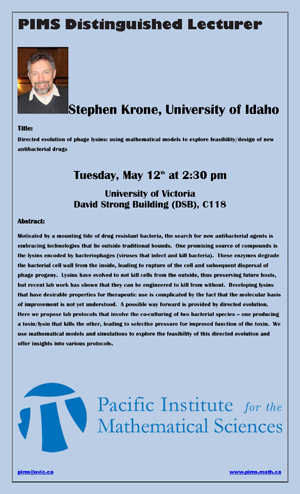PIMS-UVic Distinguished Lecture: Stephen Krone
Topic
Speakers
Details
Motivated by a mounting tide of drug resistant bacteria, the search for new antibacterial agents is embracing technologies that lie outside traditional bounds. One promising source of compounds is the lysins encoded by bacteriophages (viruses that infect and kill bacteria). These enzymes degrade the bacterial cell wall from the inside, leading to rupture of the cell and subsequent dispersal of phage progeny. Lysins have evolved to not kill cells from the outside, thus preserving future hosts, but recent lab work has shown that they can be engineered to kill from without. Developing lysins that have desirable properties for therapeutic use is complicated by the fact that the molecular basis of improvement is not yet understood. A possible way forward is provided by directed evolution. Here we propose lab protocols that involve the co-culturing of two bacterial species -- one producing a toxin/lysin that kills the other, leading to selective pressure for improved function of the toxin. We use mathematical models and simulations to explore the feasibility of this directed evolution and offer insights into various protocols.
Additional Information
Stephen Krone, University of Idaho

